[Warning: General spoilers ahead.]
With the Winter Olympics in the rearview mirror, CBC returns to original programming next week with the tentpole premiere of its landmark drama series, The Porter. A rich, wide-ranging story of Black Canadians during the 1920s, the series follows the story of the titular porters who work the railways and their extended community of family and friends in Montreal.
Conceived, produced, written, and acted by a who’s who of Black Canadian and American creatives, each episode explores the good, the bad, and the ugly of that that time in history, pulling no punches on the realities the community faced.
Our entry into the story comes through two longtime friends, Junior Massey (Aml Ameen) and Zeke Garrett (Ronnie Rowe Jr.), both veterans of the first World War who returned home to find the general public still had them assigned to a specific lane. Junior itches for more, and freely steps outside of it and into a world of lawlessness, scrabbling to make more of his life than the world thinks he should have. In so doing, he risks not only himself, but his family, wife Marlene (Mouna Traoré), who works as a nurse, and their young son, Teddy (Jahron Wilson).
Zeke acquiesces to the restrictions while still trying to hold onto a past not yet revealed. He’s the peacekeeper, trying to maintain calm between the Black porters and the white men working the kitchen and as engineers.
And then a tragedy befalls one of their crew, and it sets off a chain of events for both men, as well as showgirl Lucy (Loren Lott), who faces her own community bias of colourism that holds her back from moving to the star position in the shows at the Stardust club run by Pop (Kevin Hanchard). The cast also includes Oluniké Adeliyi as a Miss Queenie, a potential business partner for Junior, and Alfre Woodard (who also produces) as brothel worker Fay, who strikes up an unlikely friendship with Marlene.
I recently chatted with the creative team about the show.
The series was initially conceived by Arnold Pinnock and Bruce Ramsay back in 2016, long before the Black Lives Matter movement forced a cultural reset. Co-showrunner Annemarie Morais says those larger world events helped them open up the story by the time they were greenlit in the winter of 2020.
“We always wanted to tell a story about unapologetic Black ambition. I think the world around us changing allowed that story to be told in a more accessible way. I think there was a greater embrace because the changing world was just a reflection of the need or the outcry, the outpouring of people wanting to see themselves in all levels of life and that included on their screens,” she explains.
“I think we benefited, even though it was and it continues to be an immense struggle that is painful, hard, difficult, and frustrating. But it’s also joyous and triumphant, hopeful, and optimistic. So we are beneficiaries of this change in progress.”
“It was just such a blessing to be able to share the weight with the creative team. It took a minute to get this show up and going, but I always think of the trials and tribulations that we went through, whenever it got tough, I just kept on thinking of the porters themselves and the women who actually were the backbone of the union and the trials and tribulations they went through,” adds Pinnock, who not only co-created the series and is an executive producer and writer this season but also appears onscreen as Glenford, a senior porter on the railway.
“It wasn’t supposed to be easy. Getting this done was not supposed to be a cakewalk, and in doing so, people took this show personally, and they took it on their backs as well and shared the load and I’m just really proud of the team.”
The team is aware that the subject matter walks a fine line, and they worked hard to find a balance in building the world of The Porter and populating it with a rich mix of characters and stories.
“When we were writing, we really had this sense that the show should feel aspirational, that it was about Black ambition and it was about, ‘What are their dreams? What are they fighting for? What do they want?’ And so we started there. We knew that we didn’t want to focus on the part of their lives that was about servitude,” says co-showrunner Marsha Greene.
“Of course it was going to be called, and we were going to show them being porters and show them in the community, but our focus was really about their lives and what they wanted and how did that relate to our experience today? Then we would get them into these situations.”
“We knew that we were going to have to show some of the tougher aspects and we felt in some ways it’s even more powerful because it’s not something you see all the time, that in fact you get lulled into, in some ways, their agency, how capable they are, how strong they are, how much they’re fighting.”
“And then they get sucker punched sometimes by this other reality, much like I think life is and life can be. In putting our focus on the porters and the community being the center of the story, we were able to find, quite easily, the joy, the faith, the community, and the laughter.”
“There was a consensus even with our cast and when we spoke about scenes or the tonality of them … we came to this project when it was such a heightened time of trauma for all of us. And I think that we are carrying a lot of it. It was also dealing with [the fact that] these issues existed a hundred years ago, and then trying to approach it with our hearts and our souls, knowing that we’re speaking to our lineage. But at the same time trying to not make this something that was entrenched in servitude or the downtroddenness of life. There’s community and music and love,” shares director Charles Officer.
“Annemarie and Marsha constantly talked about the love between Marlene and Junior and that Zeke had to leave behind [to] come to Canada and Lucy and the relationship with her mother and these dynamics of Black love. I think it helped to find a balance of not looking at it as this heavy weighted story that we’re telling, although we understood it exists and it’s there.”
“I think there is a balance with it, but I think when we’re looking at that and trying to channel that through the way we’re communicating with our cast and the way we’re looking at the scenes. Arnold coming up with developing his character and giving him these characteristics, the way he walked, the way he spoke … there’s also joy in the creative process of putting it all together.”
“Sometimes when you’re working on something that’s heavy, you can go down a rabbit hole of being in there. And I think that at times it would constantly come up in meetings and conversations. When we’re looking at the scripts … we can’t forget that we need this sort of balance in this show. And it was hard to track, but we shoot and then we also make it again in the editing suite, where we’re able to look at the material and try to see where we have space to provide that balance.”
“We were watching episode five and [Charles] was laughing at all these various parts [and saying how much he] loved [certain] parts. And [director] R.T. Thorne has a lot of humor in his episodes. I feel like this show doesn’t even fit really into one genre. When we were writing, [we’d be asked], ‘What is it like,” recalls Greene.
“And [we’d say], ‘It’s a family drama. It’s a dark drama. It’s network. It’s cable.’ It’s all of these things that we hope came together in a beautiful, seamless way. But for a long time, it was just really trying to show the totality of their experiences and that brought in all of those other things.”
The first season is a very tight eight episodes, packed with many, many character threads, and the team said being limited by that episode count gave them a head start on the stories they can tell in Season 2, should they get it. “[We faced] very difficult choices in the editing room. I don’t think we really realized until production [how tight it would be]. On the page, it all seemed to work. Then we got to production [and realized], ‘There are a lot of things here. And there are a lot of people here,’ and then we got to post-production and [saw] there was a lot to cover,” explains Greene.
“Personally there were definitely things that we didn’t get to delve into as much in Season 1. And I really hope that the show can continue on so we can dig deeper into those stories because there’s a lot of story [to tell].”
“The backbone of the series is really this brotherhood that comes together and falls apart and the formation of this Black union. I think when we’re thinking about [a possible] second season, we want to know the stories beneath the surface … who are our leaders, who are our heroes? We’re drawn to the humanity and the things that make them do the things that they do, that make them risk the things that they risk,” adds Morais.
“When we see our heroes, our legends, and all of their faults, failings, strengths, and weaknesses, I think it makes the journey that much more interesting. I think in a second season, we’re really going to peel back the skin a little bit and see why they’re doing the things that they’re doing and the ways that they’re doing them.”
“It’s pretty magical. We did leave some things out, [and] could have had a little bit more runway fitting things but we were very blessed that we were able to run some of our episodes a little bit longer than a standard broadcast hour. Our runway was extended, here and there, which helped us. The intention is pretty intact of what the plan was and where we’re at [at the end of the season]. And I’m very excited to see what comes [next],” says Officer.
R.T. Thorne, who split directing duties for the season with Officer agrees. “Sometimes it’s better to come in and tell a tightly packed story, especially in our time right now. There’s a lot of content to watch. As a viewer, not even a content creator, 20 episodes [feels like too much]. We have plenty of stuff to tell for a second season. There’s so much that people don’t know about the Black Canadian experience and the North American experience and the diversity of that,” he says.
“Eight [episodes] felt like the right number [this season]. If you’d asked us during the start of the editing process, we would’ve [said], ‘I wish we could have had nine.’ But we made it [work].”
The Porter premieres Monday at 9 pm on CBC and CBC Gem in Canada and will be on BET+ in the US later this year. Here’s a sneak peek.
Photos and Video Courtesy of CBC.
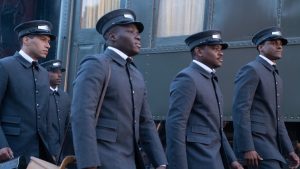
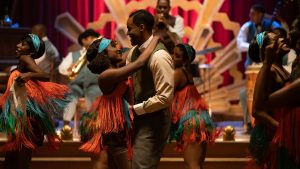
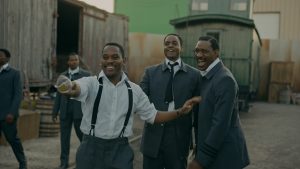
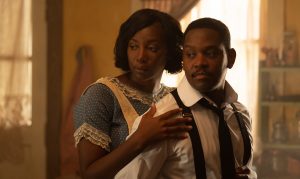
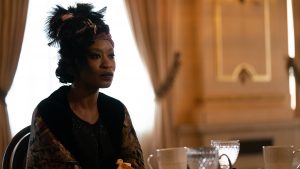
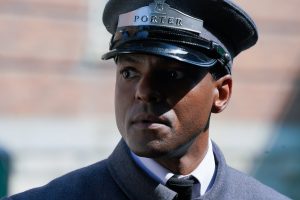
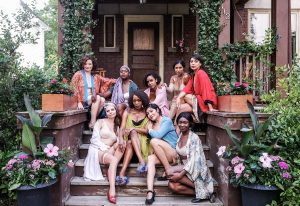

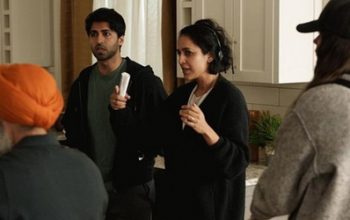
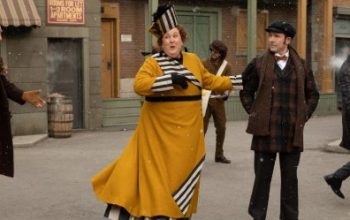
One thought on “Previewing CBC’s The Porter with the Creative Team”